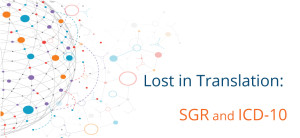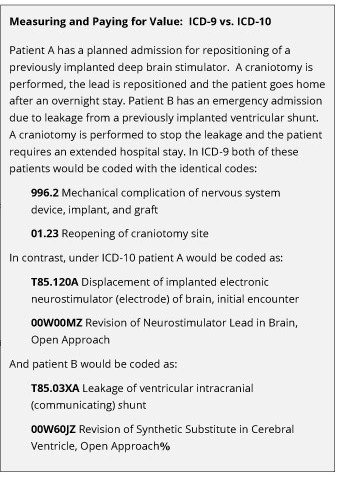 In the film Lost in Translation as the end of their time together approaches, Scarlett Johansson tells Bill Murray “Reality changes things…we can’t stay here forever.” One of the core reforms in the SGR bill (H.R. 2) is a move from a physician payment system that rewards volume to one that rewards value. The move to measuring and paying for value means the reality of SGR has changed things. To be committed to paying for value means we can’t stay on ICD-9 forever and there is no viable alternative but to move to ICD-10 as rapidly as possible.
In the film Lost in Translation as the end of their time together approaches, Scarlett Johansson tells Bill Murray “Reality changes things…we can’t stay here forever.” One of the core reforms in the SGR bill (H.R. 2) is a move from a physician payment system that rewards volume to one that rewards value. The move to measuring and paying for value means the reality of SGR has changed things. To be committed to paying for value means we can’t stay on ICD-9 forever and there is no viable alternative but to move to ICD-10 as rapidly as possible.
There appears to be widespread support for the SGR reform bill within the physician community. But something must be getting lost in translation because at the same time, rumors persist that some physician associations remain opposed to the adoption of ICD-10 and will continue to seek yet another delay. How can a move to measuring and paying for value possibly be accomplished without a modern diagnostic and procedure coding system like ICD-10? Having the necessary detail is essential to accurate measurement of value. After all, reputations and financial viability are at stake.
 The sidebar example of complications of care experienced by two patients illustrates why an archaic coding system like ICD-9 is an ineffective basis for measuring and paying for value. With ICD-9 coding all that would be known about these patients is that there was some unspecified complication of a previously implanted unspecified device that required a craniotomy. How can there be any meaningful measurement of value when these two radically different patients would be identically coded? Essential patient information is lost in the translation to ICD-9 codes.
The sidebar example of complications of care experienced by two patients illustrates why an archaic coding system like ICD-9 is an ineffective basis for measuring and paying for value. With ICD-9 coding all that would be known about these patients is that there was some unspecified complication of a previously implanted unspecified device that required a craniotomy. How can there be any meaningful measurement of value when these two radically different patients would be identically coded? Essential patient information is lost in the translation to ICD-9 codes.
In a scene from Lost in Translation, Bill Murray shoots a commercial in Japan. The director gives him long, complicated instructions in Japanese, but the translator translates the instructions into only a few words of English. Bill Murray asks:
“Is that everything? It seemed like he was saying a lot more.”
And so it is with ICD-9, a lot gets lost in translation.
In contrast, ICD-10 provides a clear specification of the type of complication experienced by each patient (displacement vs. leakage) and the type of previously implanted device (neurostimulator vs. ventricular shunt). Essential patient information is maintained in the translation to ICD-10 codes.
Since this example relates to inpatient care it may not appear relevant for physicians because the ICD-10 procedure codes will only be reported by hospitals; physicians will continue to report procedures using CPT codes. ICD-10 diagnosis codes will be reported by both physicians and hospitals and will impact outcome measures like complication rates. It is important to understand that SGR requires that the measures used to determine physician performance “emphasize the application of outcome measures” and include “measures for inpatient hospitals” and “global outcome measures” that are risk adjusted “based on an individual’s health status and other risk factors.” Thus, the ability to precisely code and report a patient’s diagnoses and procedures across all sites of service is critical to measuring and paying for value under SGR.
Despite opposition to ICD-10 by some physician groups and a few isolated state medical societies, there is general recognition in the medical community that a modern and precise coding system like ICD-10 is essential for measuring and paying for value. Over the past three years there has been an unrelenting demand by physician specialty societies to add even more specificity to ICD-10 as evidenced by specialty societies requesting that 1,402 new codes be added to ICD-10 in the past three years – 95 percent of all new codes requested during that time.
The requests from medical societies to add even more detail to ICD-10 and the requirements of SGR demonstrate that reality has changed and we can no longer fail to have a precise and unambiguous description of a patient’s illnesses and procedures. ICD-9 represents medicine of a bygone era. It cannot support a move to measuring and paying for value. To meet the demands of SGR there can be no further delays in the ICD-10 implementation date.
This article was originally published on Coalition for ICD-10.
